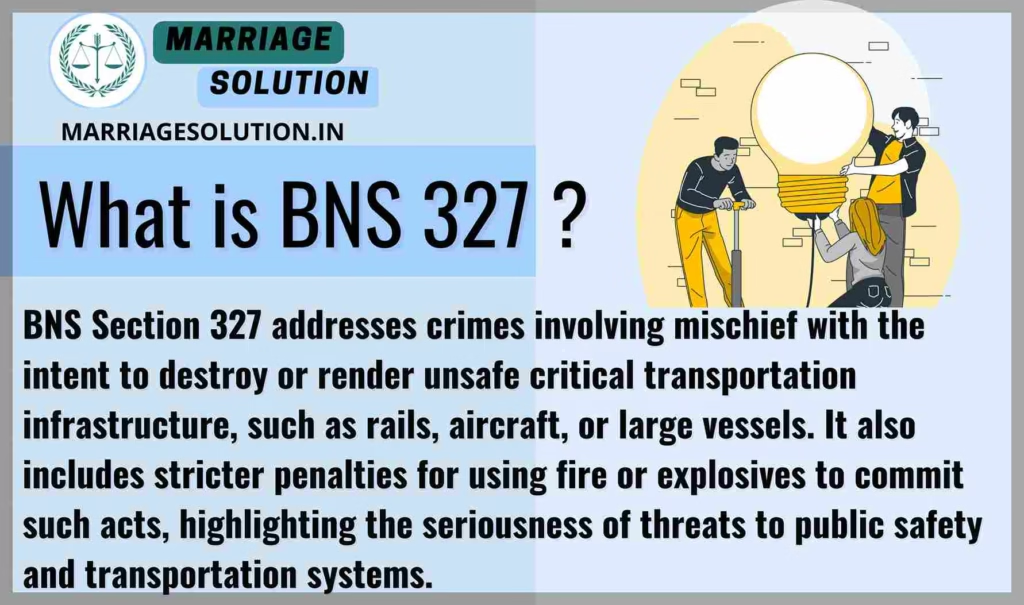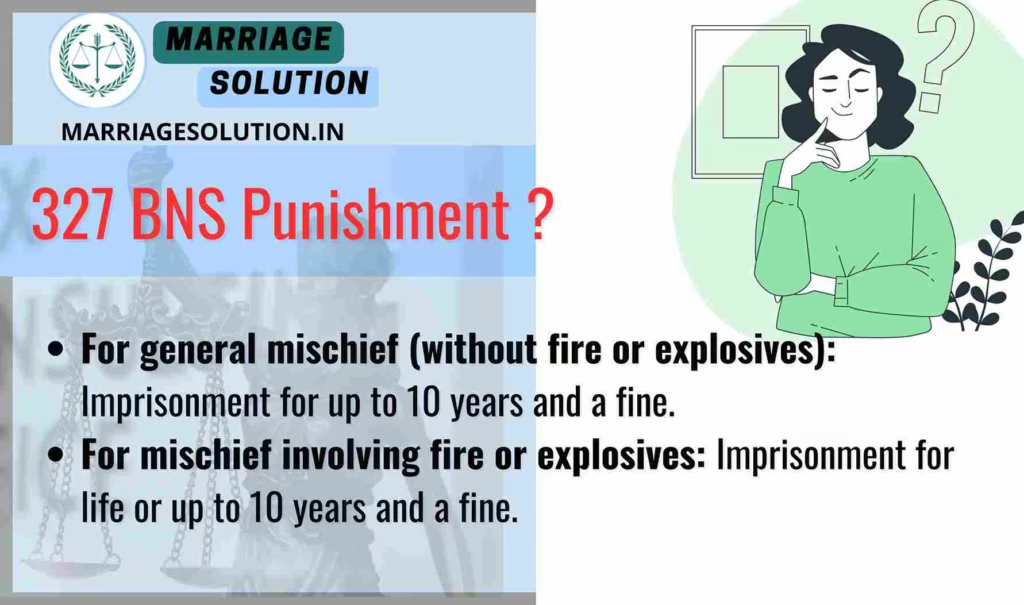Introduction of 327 BNS
327 BNS focuses on serious acts of mischief targeting transportation systems such as railways, aircraft, and large vessels of 20 tons or more. It criminalizes deliberate attempts to destroy, damage, or render unsafe critical infrastructure, ensuring public safety and protecting national assets. The section also prescribes harsher punishments for using fire or explosives, recognizing the devastating risks such actions pose to passengers, crew, and goods. By replacing IPC Sections 437 and 438, BNS 327 strengthens India’s legal framework against sabotage and destructive acts aimed at vital transport systems.
The Bharatiya Nyaya Sanhita (BNS) Section 327 replaces the old Indian Penal Code (IPC) Section 437and 438.
What is BNS Section 327 ?
BNS Section 327 addresses crimes involving mischief with the intent to destroy or render unsafe critical transportation infrastructure, such as rails, aircraft, or large vessels. It also includes stricter penalties for using fire or explosives to commit such acts, highlighting the seriousness of threats to public safety and transportation systems.

Under Section 327 of the bns act 2023
“Whoever commits mischief with intent to destroy or render unsafe any rail, aircraft, decked vessel, or a vessel of twenty tons burden, shall be punished with imprisonment which may extend to ten years, and shall also be liable to fine. If such mischief is committed by means of fire or explosive substance, or an attempt is made to do so, the offender shall be punished with imprisonment for life, or with imprisonment up to ten years, and shall also be liable to fine.”
1. Meaning of Mischief under Section 327
- This section covers serious acts of mischief that specifically target transportation systems such as:
- Railways
- Aircraft
- Decked vessels or ships of 20 tons or more capacity
- Mischief here means any deliberate or fraudulent act that destroys, damages, or makes unsafe these systems.
- The purpose is to protect public safety, transport infrastructure, and national security.
2. Who is Covered?
This section applies to anyone who:
- Damages or tampers with railway lines, aircraft parts, or vessels.
- Creates unsafe conditions (example: removing tracks, disabling aircraft systems).
- Uses fire or explosives to commit or attempt such acts.
- Works individually or in groups to sabotage transport systems.
3. Nature of the Offense
- Cognizable → Police can register FIR and arrest without prior magistrate approval.
- Non-Bailable → Bail is not a right; it can only be granted by the court.
- Non-Compoundable → Cannot be privately settled between parties.
- Triable by Court of Session → Due to seriousness, cases go to higher criminal courts.
4. Examples of BNS Section 327
- Railway Mischief → A person removes fishplates from railway tracks to cause derailment.
- Aircraft Sabotage → Tampering with an aircraft navigation system before takeoff.
- Vessel Sabotage → Using tools to damage the hull of a cargo ship of 20 tons.
- Explosive Attack → Planting a bomb on a railway line or inside an aircraft.
5. Punishment under BNS Section 327
- General Mischief (no fire/explosives):
Imprisonment up to 10 years and fine. - With Fire or Explosives (or attempt):
Life imprisonment or up to 10 years imprisonment, and fine.
6. Importance of BNS Section 327
- Safeguards critical transport infrastructure.
- Deters sabotage and terrorist-like activities against public safety.
- Protects passengers, crew, goods, and national economy.
- Provides strict punishments to discourage destructive acts.
Section 327 BNS Overview
Bharatiya Nyaya Sanhita (BNS) Section 327 focuses on acts of mischief intended to destroy or render unsafe critical transportation systems such as rails, aircraft, decked vessels, or vessels with a burden of 20 tons or more. It also addresses the use of fire or explosives in such acts, emphasizing the need to safeguard public safety and critical infrastructure.
BNS Section 327: 10 Key Points
1. Scope of BNS Section 327
BNS Section 327 addresses acts of mischief aimed at destroying or making unsafe critical transportation systems such as rails, aircraft, decked vessels, or vessels of 20 tons or more. It highlights the importance of safeguarding such systems for public safety and economic stability. By encompassing both intent and negligence, this section ensures accountability for actions that threaten vital infrastructure and lives.
2. Intent to Destroy or Render Unsafe
The law covers mischief acts carried out with the intent to destroy or render transportation systems unsafe. Even if the destruction is not completed but the action knowingly creates a risk, the offender can be charged under this section. This provision ensures that preemptive actions can be taken against individuals planning harmful activities.
3. Use of Fire or Explosive Substances
If fire or explosives are used in committing the offense, it significantly escalates the crime’s gravity. These tools can cause widespread damage, harm, or fatalities. Offenses involving such methods result in harsher punishments, including life imprisonment, reflecting the risk to large groups of people and essential infrastructure.
4. Classification of Offenses
Under BNS 327, offenses are classified as cognizable, meaning police can arrest the offender without prior approval from a magistrate. This ensures swift action to prevent further damage. The offenses are also non-bailable, emphasizing the seriousness of these crimes and requiring judicial discretion for granting bail.
5. Punishment for General Mischief
For acts of mischief aimed at destroying or making unsafe rails, aircraft, or vessels without using fire or explosives, the punishment includes imprisonment of up to 10 years and a fine. This penalty underscores the importance of deterring crimes against critical infrastructure, even when they do not involve high-risk tools.
6. Punishment for Fire or Explosive-Related Mischief
For mischief involving fire or explosives, the punishment increases to life imprisonment or imprisonment of up to 10 years, along with a fine. The law takes into account the devastating consequences such actions can have on public safety, lives, and property.
7. Impact on Public Safety and Infrastructure
The section ensures that acts of mischief targeting transportation systems are taken seriously due to their potential to harm lives and disrupt essential services. It provides legal protection for infrastructure critical to public welfare, such as railway tracks, aircraft, and large vessels.
8. Judicial Authority and Trial Process
Offenses under this section are triable by the Court of Session, reflecting the gravity of the crimes. Courts assess the intent, methods, and consequences of the actions to deliver appropriate sentences. This ensures a thorough judicial review for crimes impacting national and public interests.
9. Accountability for Attempted Acts
Even if the destruction or unsafe conditions are not fully realized, the law penalizes attempts under this section. By addressing both completed and attempted offenses, the law reinforces the seriousness of endangering public safety and transportation systems.
10. Liability for Collaboration
The section can apply to groups of individuals working together to commit such acts. It holds all participants accountable, ensuring that collaborative efforts to harm transportation systems are met with strict consequences. This prevents organized attempts to disrupt infrastructure.
Examples of BNS Section 327
- Tampering with Aircraft Navigation Systems
A person intentionally disables an aircraft’s navigation system before takeoff, making it unsafe for operation. This action falls under BNS 327 as it endangers the lives of passengers and crew. - Using Explosives to Sabotage a Railway Track
An individual places explosives on a railway track to derail a train. This act, involving fire or explosives, attracts the harsher punishment outlined in BNS 327(2).
BNS 327 Punishment
- For general mischief (without fire or explosives): Imprisonment for up to 10 years and a fine.
- For mischief involving fire or explosives: Imprisonment for life or up to 10 years and a fine.

BNS 327 bailable or not ?
Offenses under BNS 2327 are non-bailable, meaning the accused cannot demand bail as a right. Bail can only be granted at the discretion of the court.
Bharatiya Nyaya Sanhita Section 327
| Section | Offense | Punishment | Bailable / Non-Bailable | Cognizable / Non-Cognizable | Trial By |
|---|---|---|---|---|---|
| BNS Section 327(1) | Mischief with intent to destroy or render unsafe any rail, aircraft, decked vessel, or vessel of 20 tons burden. | Imprisonment up to 10 years, and fine. | Non-Bailable | Cognizable | Court of Session |
| BNS Section 327(2) | Mischief as above when committed by fire or any explosive substance (or attempt to do so). | Imprisonment for life or imprisonment up to 10 years, and fine. | Non-Bailable | Cognizable | Court of Session |
| IPC Section 437 (Old) | Mischief with intent to destroy or render unsafe a decked vessel or a vessel of 20 tons burden. | Imprisonment up to 10 years, and fine. | Non-Bailable | Cognizable | Court of Session |
| IPC Section 438 (Old) | Punishment for the mischief described in the previous section when committed by fire or explosive substance (or attempt). | Imprisonment for life or imprisonment up to 10 years, and fine. | Non-Bailable | Cognizable | Court of Session |
BNS Section 327 FAQs
1. What does BNS Section 327 cover?
BNS Section 327 deals with mischief acts targeting rails, aircraft, and large vessels, aiming to destroy or render them unsafe. It also covers acts involving fire or explosives, which escalate the severity of the crime.
2. What is the punishment for mischief under BNS Section 327?
Punishment varies:
Mischief involving fire or explosives: Life imprisonment or up to 10 years, and a fine.
General mischief: Imprisonment of up to 10 years and a fine.
3. Are offenses under BNS Section 327 bailable?
No, offenses under BNS Section 327 are non-bailable, meaning bail is only granted at the court’s discretion.
4. How are offenses under BNS Section 327 classified?
These offenses are classified as cognizable, allowing police to take immediate action, and non-compoundable, meaning they cannot be settled out of court.
5. Who tries cases under BNS Section 327?
All cases under BNS Section 327 are triable by the Court of Session, ensuring a thorough judicial process for serious crimes.
6. Does BNS Section 327 address attempted crimes?
Yes, even attempts to destroy or render transportation systems unsafe are punishable under this section. The law recognizes the potential risks associated with such attempts.
Conclusion
BNS Section 327 plays a crucial role in protecting transportation safety and infrastructure integrity. By punishing mischief against rails, aircraft, and vessels with up to life imprisonment, it sends a strong message against sabotage and malicious destruction. Whether the offense involves general tampering or the use of fire and explosives, the law ensures strict accountability to safeguard passengers, crew, and cargo. This section not only preserves public trust in transport systems but also acts as a deterrent against potential threats to national security and public welfare.
Need Legal Support?
If you are dealing with court cases, marriage problems, or any other legal issue, our team at Marriage Solution – Lawyer Help is here for you. Simply fill out our quick online enquiry form, and we’ll connect you with the right legal expert to support your needs.
Finished with BNS 327 ? Continue exploring the next provisions of the Bharatiya Nyaya Sanhita (BNS), 2023. Each section includes explanations, examples, and plain-language breakdowns for easy understanding.
Of Criminal Trespass .
- 328 BNS : Punishment for intentionally running vessel aground or ashore with intent to commit theft, etc
- https://marriagesolution.in/bns_section/328-bns/
- 329 BNS : Criminal trespass and house-trespass.
- https://marriagesolution.in/bns_section/329-bns/
- 330 BNS : House-trespass and house-breaking.
- https://marriagesolution.in/bns_section/330-bns/
- 331 BNS : Punishment for house-trespass or housebreaking .
- https://marriagesolution.in/bns_section/331-bns/
- 332 BNS : House-trespass in order to commit offence .
- https://marriagesolution.in/bns_section/332-bns/
Full IPC Section List: https://marriagesolution.in/ipc-section-list
All Indian Law & Blogs: https://marriagesolution.in/indian-law/
Full BNSS Section List: https://marriagesolution.in/bnss_section-list
